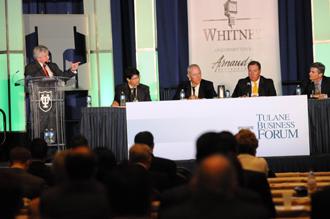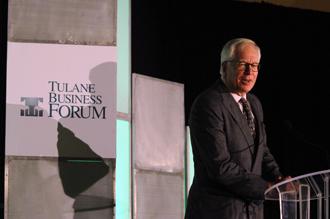Sports takes the spotlight at Tulane Business Forum
From the NBA All-Star Game and the BCS College Football Championship to the NCAA Men’s Final Four and the Super Bowl, New Orleans has in the last four years reemerged as one of the nation’s leading destinations for major sporting events.

At the 33rd annual Tulane Business Forum, which took place on Friday (Sept. 28) at the Hilton New Orleans Riverside, a panel of local sports officials said that impressive post-Katrina run isn’t an accident.
“I can think back five or six years ago to conversations that all of us here had in terms of what can our industry do to impact and contribute to the recovery of our state,” said panelist Rick Dickson, Tulane athletics director. “It’s been very gratifying to help to facilitate these events.”
Joining Dickson for the panel discussion of sports and economic development were Dennis Lauscha, president of the New Orleans Saints and New Orleans Hornets; Doug Thornton, senior vice president of SMG, the management company for the Mercedes-Benz Superdome and the New Orleans Arena; and Jay Cicero, president and CEO of the Greater New Orleans Sports Foundation. Mark Romig, president and CEO of New Orleans Tourism Marketing Corp., moderated the session.
Increased collaboration has been a big factor in attracting major sporting events to the city, but an even bigger factor may be the city itself. According to the panelists, no other city in the nation features world-class venues and abundant hotel rooms within walking distance of a hospitality center like the French Quarter.
That compact footprint enables the city to save millions in hosting expenses. While Super Bowls in Indianapolis and Dallas cost upwards of $35 million, New Orleans is hosting Super Bowl XLVII for about $13.5 million.
“The reason we can do that is because of our footprint and because of everyone working together,” said Lauscha. “It’s really amazing when you think we’re going to have one of the best Super Bowls, and we’re going to do it for about a third of the cost of Dallas.”
With the title “Scoring Big: Building on Business Victories,” this year’s forum had a sports theme. In addition to the panel discussion, Tulane President Scott Cowen delivered a sobering presentation on the state of intercollegiate athletics, an institution facing serious obstacles in the form of increased commercialism, challenges to amateurism, questions of integrity, a lack of financial sustainability and concerns over player safety.

“The current system is not sustainable in its current form,” Cowen said. “I want to be proven wrong. I believe very strongly in the value of intercollegiate athletics in the higher education community. I would just like to make sure that it’s sustainable and that it represents the values that we always envisioned for intercollegiate athletics.”
Delivering the keynote addresses this year were Carl J. Chaney, president and CEO of Whitney Bank, who discussed Hancock Holding Co.’s acquisition of the venerable New Orleans bank in 2010, and Carl J. Schramm, president of Schramm & Co. and former president of the Kauffman Foundation, whose luncheon keynote talk addressed ways to make American capitalism more entrepreneurial.
The program also included presentations by Beth A. Brooke, global vice chair of public policy with Ernst & Young, who discussed the potential impacts of the presidential election on business, and John C. Sheptor, former president and CEO of Imperial Sugar Co., who talked about how he repositioned Imperial for new products and markets.
The Tulane Business Forum is an annual presentation of the A. B. Freeman School of Business and the Tulane Association of Business Alumni (TABA).
Interested in advancing your education and/or career? Learn more about Freeman’s wide range of graduate and undergraduate programs. Find the right program for you.
Other Related Articles
- Alumna leverages Freeman network to land dream job at Entergy
- Alumna recalls trailblazing career in business, ministry
- Students network their way through Manhattan in annual Real Estate Trek
- Futurist series highlights consumerization of health care
- Forbes: 4 Remedies For Reducing Generative AI Mediocrity
- Snapping Back: Alumna is HP’s guardian against disruption
- Goes highlights growth, AI initiatives in ‘State of the School’ address
- Research Notes: Shuhua Sun
